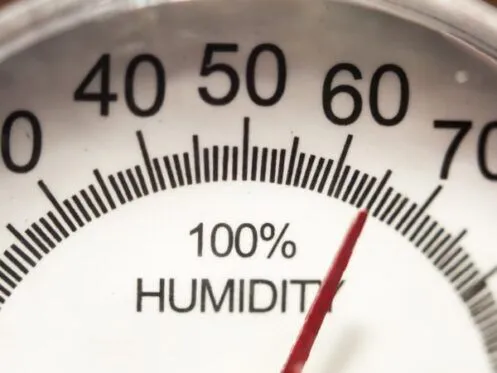
What’s Causing High Humidity in Your Home?
High humidity inside your home can lead to discomfort, mold growth, and potential damage to your property. If you’ve been noticing excessive moisture, condensation on windows, or a musty odor, it’s important to identify the root cause and take corrective action.
Understanding the factors contributing to high humidity in your home can help you find effective solutions to improve indoor air quality and maintain a comfortable environment.
Common Causes of High Indoor Humidity
Poor Ventilation
One of the primary causes of high humidity levels is inadequate ventilation. When moist air gets trapped inside your home with no way to escape, it accumulates and increases overall humidity levels. Bathrooms, kitchens, and laundry rooms are especially prone to excess moisture due to daily activities like showering, cooking, and washing clothes. Without proper ventilation, humidity has nowhere to go, leading to lingering moisture issues.
Leaky Plumbing and Water Damage
Undetected leaks from pipes, faucets, or the roof can introduce excess moisture into your home, creating an ideal environment for high humidity and mold growth. Even small leaks can have a significant impact over time. Water damage from flooding or plumbing issues should be addressed immediately to prevent humidity problems from escalating.
Poorly Sealed Windows and Doors
Gaps and cracks around windows and doors can allow warm, humid air to enter your home, particularly in summer months. If your home is not properly sealed, outside air can infiltrate and raise humidity levels. Weatherstripping and caulking around windows and doors can help keep moisture out and maintain a more balanced indoor environment.
Excessive Use of Humidifiers
While humidifiers are great for adding moisture in dry conditions, overusing them can tip the balance and cause too much humidity in your home. It’s essential to monitor humidity levels and use humidifiers only when necessary to maintain an optimal range (between 30% and 50%).
Improperly Sized HVAC System
Your heating and cooling system plays a crucial role in regulating humidity levels. If your air conditioner is too large for your home, it may cool the space too quickly without effectively removing humidity. On the other hand, an undersized unit may struggle to keep up with dehumidification. A properly sized HVAC system ensures balanced cooling and humidity control.
Everyday Activities
Daily tasks like cooking, boiling water, drying clothes indoors, and even breathing contribute to humidity levels. If moisture is not adequately ventilated, it accumulates in your home over time. Simple actions, such as using exhaust fans in kitchens and bathrooms, can help keep humidity under control.
Crawl Spaces and Basements
If your home has a basement or crawl space, it may be contributing to excess humidity. These areas often retain moisture due to poor drainage, leaks, or lack of insulation. When humid air rises from these spaces, it affects the entire home. Installing a vapor barrier or using a dehumidifier in these areas can help mitigate the issue.
Seasonal Changes
Warm summer months bring higher humidity levels, which can seep into your home through open windows and doors. Additionally, rainy weather can contribute to excessive indoor moisture if your home lacks proper sealing and ventilation. Being mindful of seasonal humidity changes can help you take proactive steps to regulate moisture levels.
How to Reduce High Humidity in Your Home
Now that we’ve identified the common causes of high humidity, here are some practical solutions to help maintain a comfortable indoor environment:
Improve Ventilation
- Use exhaust fans in bathrooms and kitchens.
- Keep windows open when possible to encourage airflow.
- Consider installing an energy recovery ventilator (ERV) or heat recovery ventilator (HRV) to improve air exchange.
Fix Leaks and Address Water Damage
- Regularly inspect pipes, faucets, and the roof for leaks.
- Repair any water damage immediately to prevent mold and mildew growth.
- Use a dehumidifier in damp areas to help remove excess moisture.
Seal Windows and Doors
- Apply weatherstripping and caulk around gaps to prevent humid air from entering.
- Check for drafts and address insulation issues to keep indoor humidity levels balanced.
Use a Dehumidifier
- A dehumidifier helps remove excess energymoisture from the air, particularly in damp areas like basements and crawl spaces.
- Choose the right-sized unit for your home’s needs.
Maintain Your HVAC System
- Schedule regular maintenance to ensure your HVAC system is functioning efficiently.
- If your air conditioner is not effectively reducing humidity, consider upgrading to a system with built-in humidity control.
Adjust Daily Habits
- Dry clothes outside or use a vented dryer to prevent adding moisture indoors.
- Cook with lids on pots and use range hoods to vent steam.
- Take shorter showers and use exhaust fans to remove moisture from the bathroom.
When to Call a Professional
If you’ve tried various methods to control humidity and are still experiencing excessive moisture problems, it may be time to consult a professional. Persistent high humidity can lead to structural damage, health concerns, and costly repairs if left unaddressed.
Let CJS Heating & Air Help!
At CJS Heating & Air, we specialize in creating comfortable, energy-efficient homes by providing top-quality HVAC services. Our expert team can:
- Inspect and repair HVAC systems to ensure proper humidity control.
- Recommend and install dehumidifiers tailored to your home’s needs.
- Identify and fix ventilation issues to improve indoor air quality.
Don’t let high humidity take over your home. Schedule an appointment with CJS Heating & Air today for a consultation and breathe easier knowing your home’s air quality is in expert hands!





